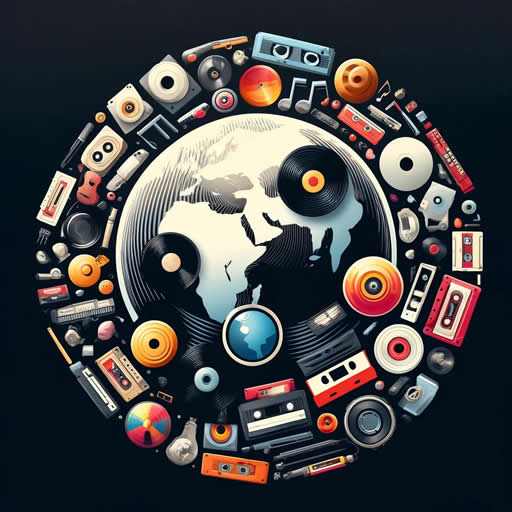The End of an Era: Rainbo Records' Eight Decades of Cultural Impact
Introduction
For over 80 years, Rainbo Records was at the heart of America's music industry, pressing records that captured the diverse sounds of the nation. From rave and garage rock to rap and comedy, the Canoga Park-based company produced 45s, flexi discs, albums, 8-track tapes, cassettes, and CDs for an eclectic mix of artists and genres.
World War II Contributions
During World War II, Rainbo Records produced audio letters for soldiers stationed overseas, providing a crucial morale boost for troops. These audio letters allowed families to send personal messages, bridging the gap between home and the battlefield.
Innovative Technology and Products
By the 1950s, founder Jack Brown had revolutionized the industry with his patented “record-on-a-box” technology, embedding paper-thin records directly onto 30 million cereal packages. The company also created:
- Campaign postcards with candidates' voices
- Pre-recorded commands for boot camps
- Miniature records for talking dolls
- Unique 78-rpm cardboard picture discs
One notable commission came from Walt Disney, who hired Rainbo to manufacture the “Disneyland Talking Map,” a fold-out cardboard poster with five records sold at Disneyland's grand opening.
Iconic Albums and Artists
Rainbo Records' client list reads like a who's who of music history. Some of the most iconic albums and artists that passed through Rainbo's presses include:
- Black Flag’s “TV Party”
- Richard Pryor’s debut comedy album for Laff Records
- N.W.A’s “Panic Zone”
- Dr. Dre’s “The Chronic”
- Hüsker Dü’s “Zen Arcade”
- The Minutemen’s “Double Nickels on the Dime”
- 2Pac’s “California Love”
Additionally, contemporary artists like Kacey Musgraves, Kamasi Washington, and Childish Gambino also have their work etched into vinyl at Rainbo.
The Resurgence of Vinyl
Despite the digital revolution making physical albums seem obsolete, the resurgence of vinyl has kept the tradition alive. Vinyl sales in the U.S. grew by 14.5% in 2019, marking a 14-year increase. Nevertheless, vinyl still represents a small fraction of the market, accounting for just 4% of U.S. music sales, compared to 82% for streaming and 14% for digital downloads and CDs. In 2019, 18.8 million new LPs were sold, a stark contrast to the over 1 trillion songs streamed.
The Closing of Rainbo Records
The digital era's dominance is one reason Rainbo Records is closing its doors. On December 12, 2019, Steve Sheldon, the longtime general manager, retrieved the last record pressed by Rainbo: a blue vinyl reissue of “The Other Side of Life” by the Moody Blues. Sheldon, who has worked at Rainbo since 1971 and been its general manager for 34 years, expressed his sadness over the closure.
Challenges and Adaptations
Had he been younger, Sheldon might have considered relocating the business to states with lower operational costs like Texas or Tennessee. However, the logistics and expense of such a move were prohibitive. Instead, Sheldon spent his final months at Rainbo informing clients of the shutdown, coordinating the retrieval of stored assets, and overseeing the winding down of operations.
Client Support and Legacy
The closure has seen an outpouring of support from long-term clients. The company’s ledgers, filled with orders from punk labels like Epitaph, SST, and Touch and Go, to rap imprints like Death Row, Priority, and Sugar Hill, attest to Rainbo's extensive reach. Over the years, Sheldon has navigated various challenges, from FBI raids searching for bootleg albums to timing pickups to avoid gang conflicts.
Indie Labels and Artists
Rainbo Records has been instrumental in the success of many indie labels and artists:
- Lisa Fancher of L.A.'s punk label Frontier worked with Rainbo for nearly 40 years, pressing records for bands like Suicidal Tendencies and Christian Death.
- Brian Schuman, a former Rhino Records vice-president and now senior VP at Concord Music Group, credits Rainbo for helping Rhino thrive with their unique and often quirky releases.
Jack Brown's Vision and Innovation
Jack Brown, Rainbo's founder, had a deep understanding of the record business. A former Navy serviceman and aspiring writer, Brown established Rainbo in 1939. One of the company's early significant projects involved recording messages for families of soldiers during World War II. Brown's innovative spirit led to numerous product developments, including the popular flexi-disc, which became a staple in music magazines.
Adapting to Industry Shifts
Throughout the decades, Rainbo adapted to industry shifts, from vinyl to cassettes to CDs. The company moved to Santa Monica in 1974, expanding its operations to include cassette duplication and later CD manufacturing. Despite the challenges, Rainbo remained profitable, thanks to Brown's forward-thinking investments.
The Future: United Records and Nashville
In late December, Rainbo's equipment was transported to Nashville, where United Records, another long-standing pressing plant, acquired it. The move marks the end of an era for Rainbo Records but ensures that its legacy will continue in the hands of another venerable institution in the music industry.
Rainbo Records' history is a testament to the evolution of music consumption and production, reflecting broader cultural shifts over eight decades. While the physical production of music has changed, the impact and legacy of Rainbo Records remain indelible.
